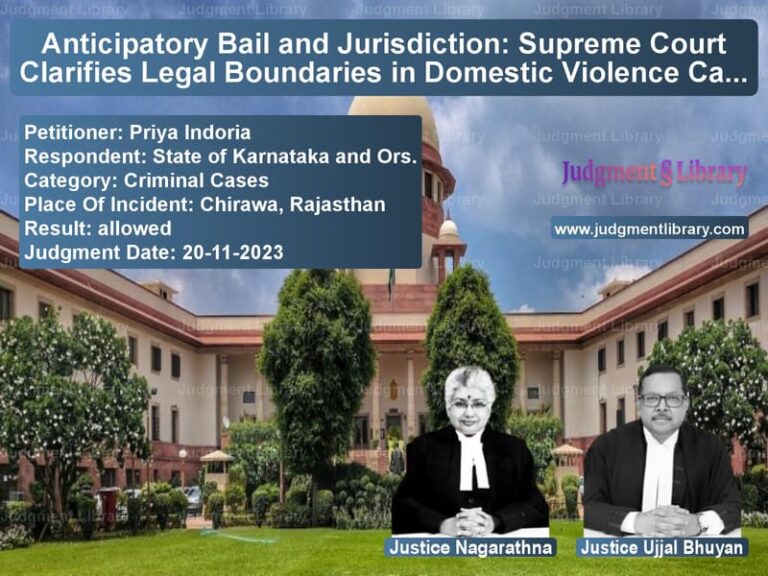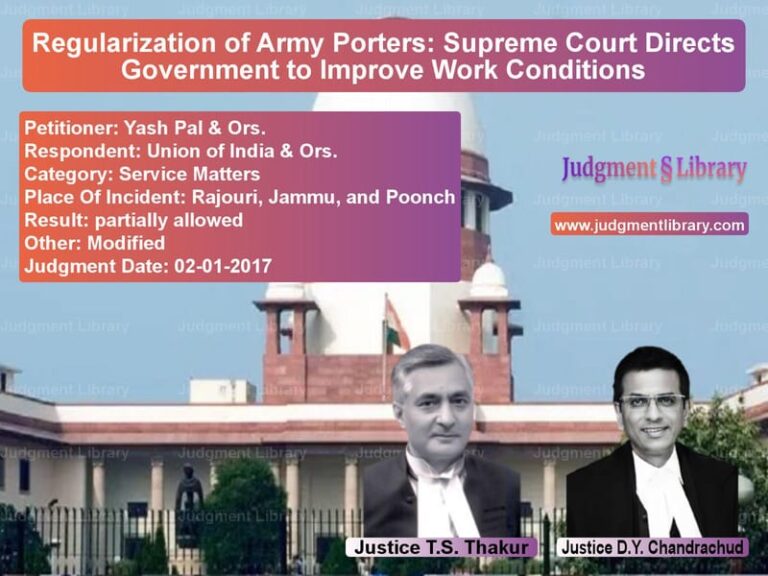Supreme Court Quashes Criminal Proceedings Against Parents in Alleged Cheating Case
The Supreme Court of India recently delivered a landmark judgment in the case of Marippan & Anr. vs. State Represented by the Inspector of Police & Anr., wherein it quashed the criminal proceedings against the appellants, who were the parents of an accused involved in an alleged cheating case. The Court held that there was no material evidence to support the criminal charges against the parents and that their prosecution would amount to an abuse of the legal process.
Background of the Case
The case originated from a complaint filed by a woman who alleged that she was in a relationship with the son of the appellants and had engaged in physical relations with him under the assurance that he would marry her. According to her, the son introduced her to his parents, who allegedly agreed to accept her as their daughter-in-law. However, later, she was informed that the son was engaged to someone else.
Based on this complaint, a chargesheet was filed against the appellants under Sections 417 (cheating) and 109 (abetment) of the Indian Penal Code (IPC). The appellants moved the High Court seeking to quash the charges against them under Section 482 of the Code of Criminal Procedure (CrPC), but their petition was dismissed. Aggrieved by this, they approached the Supreme Court.
Arguments of the Parties
Arguments by the Appellants
The learned counsel for the appellants contended:
- There was no specific allegation against the parents in the entire complaint that they had induced or instigated the complainant into the relationship with their son.
- The complaint did not state that the parents had misrepresented facts or exerted any pressure on their son to marry another woman.
- There was no direct role attributed to the parents in the alleged offense, and their mere association as parents of the main accused could not justify the criminal charges.
- The prosecution had failed to establish any criminal intent on their part, and thus, proceeding with the case against them would be unwarranted.
Arguments by the Respondents
On the other hand, the complainant’s counsel argued:
- The parents were aware of the relationship between their son and the complainant.
- The complainant had agreed to the relationship based on the assurance of marriage, and the parents’ actions had played a role in misleading her.
- The parents’ subsequent arrangement of their son’s marriage with another woman showed their complicity in the deception.
State’s Position
The learned senior counsel appearing for the State submitted that:
- Upon examining the facts, it appeared that there was no basis to hold the parents criminally liable.
- The primary allegation was against the son, and there was no evidence to show that the parents had actively participated in the alleged deception.
Supreme Court’s Analysis and Judgment
The Supreme Court, after hearing both parties, analyzed the allegations under Section 415 of the IPC, which defines cheating. The Court stated:
“From the entire reading of the complaint, it is clear that the only reference against the appellants is that they were the parents of the accused and that the complainant had met them once. There is no specific act on their part that can be termed as criminal, nor does the complaint attribute any inducement or misrepresentation by them.”
The Court further noted that the complainant was 29 years old, well-educated, and capable of making independent decisions. The Court emphasized:
“Looking at the complainant’s age and educational qualification, we find it difficult to accept that the appellants’ statements or conduct led her to develop intimate relations with their son. The allegations, at best, pertain to the son, and proceeding against the parents would amount to an abuse of legal process.”
Additionally, the Court referred to the precedent set in Vishnu Kumar Shukla v. State of Uttar Pradesh, where it was held:
“It would be unjustified to make the appellants face a full-fledged criminal trial in such a backdrop. Protection against vexatious prosecution is a duty cast on the courts, and in the present case, the High Court should have intervened to prevent unwarranted prosecution.”
Key Takeaways from the Judgment
- The Court reaffirmed that mere familial ties to an accused do not automatically make individuals liable in criminal proceedings.
- Allegations must be specific and backed by evidence; vague assertions cannot sustain criminal liability.
- The Court warned against the misuse of legal provisions to drag innocent individuals into litigation without a solid legal basis.
- Protection against harassment through frivolous criminal cases is an essential duty of the judiciary.
Final Order
The Supreme Court allowed the appeal and quashed the criminal proceedings against the appellants, stating:
“Trial against the appellants would be an abuse of the process of the Court and the same needs to be nipped in the bud. The impugned judgment is set aside, and the proceedings against the appellants are quashed.”
The Court, however, clarified that this judgment does not affect the ongoing proceedings against the son, and he will have to face the trial independently.
Conclusion
This judgment sets an important precedent in cases involving allegations of cheating and abetment. It reinforces the principle that criminal liability must be based on concrete evidence and not mere associations. By quashing the charges against the parents, the Supreme Court has upheld the rule of law and prevented the misuse of criminal proceedings to harass individuals without valid grounds.
Petitioner Name: Marippan & Anr..Respondent Name: State Represented by the Inspector of Police & Anr..Judgment By: Justice Ahsanuddin Amanullah, Justice K. V. Viswanathan.Place Of Incident: Madurai, Tamil Nadu.Judgment Date: 24-01-2025.
Don’t miss out on the full details! Download the complete judgment in PDF format below and gain valuable insights instantly!
Download Judgment: marippan-&-anr.-vs-state-represented-by-supreme-court-of-india-judgment-dated-24-01-2025.pdf
Directly Download Judgment: Directly download this Judgment
See all petitions in Bail and Anticipatory Bail
See all petitions in Fraud and Forgery
See all petitions in Legal Malpractice
See all petitions in Judgment by Ahsanuddin Amanullah
See all petitions in Judgment by K.V. Viswanathan
See all petitions in allowed
See all petitions in supreme court of India judgments January 2025
See all petitions in 2025 judgments
See all posts in Criminal Cases Category
See all allowed petitions in Criminal Cases Category
See all Dismissed petitions in Criminal Cases Category
See all partially allowed petitions in Criminal Cases Category







